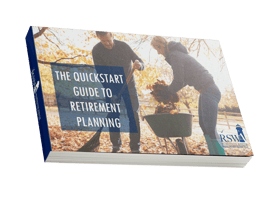This week, we will change up the pace from our regular newsletters and weekly economic data to do a deep dive into what it’s like to transition into retirement from both a financial and lifestyle perspective.
Over 4.1 million Americans will turn 65 in 2024, followed by 4.18 million in 2025 and 4.12 million in both 2026 & 2027. This cohort is the largest in history to reach this milestone age, leading the Alliance for Lifetime Income to dub this group the Peak 65 generation.
With a record number of individuals reaching this magical age where many retirement benefits become/are available (Medicare, Social Security, Pensions, etc.), historic numbers of Americans transitioning into retirement are likely to follow.
Financial Changes – Becoming a Spender, Not a Saver
What is the biggest concern for retirees? Running out of money. No question.
This probably isn’t too surprising. Forgoing a steady and secure income to rely fully on hard earned savings and government or employer retirement payments is not an easy transition in itself. Now add on the unknown variables: How long will you live? How much will costs go up over your retirement period? Will you have a major health event? What will investment returns look like?
We try to mitigate this fear and uncertainty by saving as much as we can for the decades leading up to our retirement date. For many, this meant learning to hold back a portion of wages from the minimum wage job they had while in school all the way up to the last paycheck they receive before reaching retirement. Then, on that first day of retirement, the priority shifts from saving to preserving, spending, and enjoying. Easily said, but changing a habit built up for 30-40+ years is not an easy adjustment.
Here are some tips to make this transition easier:
- Have a financial plan – a good financial plan will help you determine if your spending goals are in line with your assets and stress test it in different market and life scenarios.
- Said differently, a good financial plan can give you the confidence that spending a portion of your retirement savings today won’t jeopardize your tomorrow.
- Be willing to adapt – even the best of plans won’t be perfect. Some things will play out better than expected, some worse. Be flexible and allow yourself room to increase or decrease spending based on the circumstances out of your control.
Lifestyle Changes – The New Weekly Schedule: Six Saturdays & a Sunday
For many retirees, the start of retirement is exactly as they hoped – no set routine or working hours, more leisure time, more time with family. This honeymoon phase doesn’t last forever, though. Over time, as this phase starts to tire out, many begin to miss the structure and identity their job gave them. Some retirees begin to experience mental health issues such as depression or anxiety and are more likely to experience a heart attack or stroke than those that keep working. HelpGuide.org
Personal finance author Riley Moynes breaks retirement down into 4 phases:
- Vacation phase – the first 12-18 months of retirement, where it feels like a permanent vacation. You take the trip you’ve always wanted to take, get caught up on all the new Netflix shows, and pick up a few new hobbies.
- Lost & Loss – that honeymoon phase is over. People start to experience a loss of routine, identity, relationships, sense of purpose and power. Some will also experience “The 3 D’s”: Divorce, Depression, and Decline (both physically and mentally).
- Trial & Error – You turn the corner and begin thinking of how to make life meaningful again. Moynes points out that the answer often is to do things that you love to do and do really well.
- Reinvent & Rewire – You find the activities that you enjoy, are meaningful to you, and give you a sense of accomplishment.
I think we all will experience Phase II in some capacity. The key is to limit its length and severity. So, how do we do that? Once again, it comes down to planning: think of what your strengths are, what things you love to do, and how you might be able to apply those when you retire.
Retirement should feel like freedom. Enjoy the ability to take trips, spend more time with family, and spend your time how you want to. Doing all of that in a meaningful way will make it that much better.
Quick Hit/Resources:
- Retirement Beyond the Financial with Alan Spector – Last fall, we had retirement expert Alan Spector on a webinar to chat about retirement outside the normal financial prospective. Check out the replay here: RSWA (Password: RobinsonSmithWealth)
- Starter Financial Plan – Don’t have a financial plan yet? Take the first step and check out our free Starter Financial Plan tool on our website! Starter Financial Plan
- 5 Keys to a Great Retirement – Financial blogger Fritz Gilbert shares his 5 keys to a great retirement The Retirement Manifesto
- Retiring from a high-powered job – The more time you spend at work, the tougher your transition into retirement may be. Here are 7 hidden traps that many executives fall into in retirement. Harvard Business Review
Quote: “Experiment and try as many different things as you can and squeeze all the juice out of retirement.” – Dr. Riley Moynes
Thank you for reading RSWA Financial Advisor Insights! We welcome feedback, and please forward this to a friend! Be well, take care, and stay safe!
